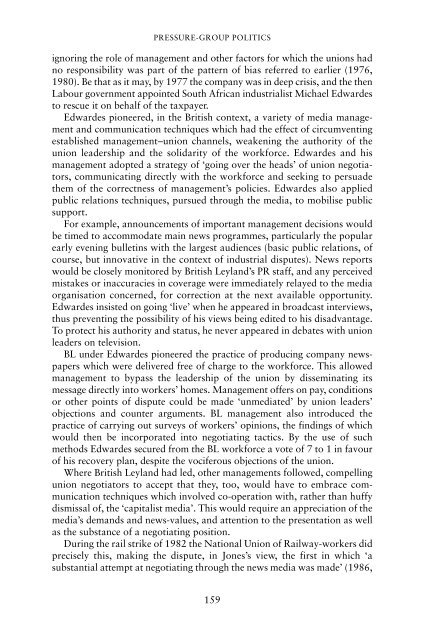20130412164339753295_book_an-introduction-to-political-communication
20130412164339753295_book_an-introduction-to-political-communication
20130412164339753295_book_an-introduction-to-political-communication
You also want an ePaper? Increase the reach of your titles
YUMPU automatically turns print PDFs into web optimized ePapers that Google loves.
PRESSURE-GROUP POLITICS<br />
ignoring the role of m<strong>an</strong>agement <strong>an</strong>d other fac<strong>to</strong>rs for which the unions had<br />
no responsibility was part of the pattern of bias referred <strong>to</strong> earlier (1976,<br />
1980). Be that as it may, by 1977 the comp<strong>an</strong>y was in deep crisis, <strong>an</strong>d the then<br />
Labour government appointed South Afric<strong>an</strong> industrialist Michael Edwardes<br />
<strong>to</strong> rescue it on behalf of the taxpayer.<br />
Edwardes pioneered, in the British context, a variety of media m<strong>an</strong>agement<br />
<strong>an</strong>d <strong>communication</strong> techniques which had the effect of circumventing<br />
established m<strong>an</strong>agement–union ch<strong>an</strong>nels, weakening the authority of the<br />
union leadership <strong>an</strong>d the solidarity of the workforce. Edwardes <strong>an</strong>d his<br />
m<strong>an</strong>agement adopted a strategy of ‘going over the heads’ of union negotia<strong>to</strong>rs,<br />
communicating directly with the workforce <strong>an</strong>d seeking <strong>to</strong> persuade<br />
them of the correctness of m<strong>an</strong>agement’s policies. Edwardes also applied<br />
public relations techniques, pursued through the media, <strong>to</strong> mobilise public<br />
support.<br />
For example, <strong>an</strong>nouncements of import<strong>an</strong>t m<strong>an</strong>agement decisions would<br />
be timed <strong>to</strong> accommodate main news programmes, particularly the popular<br />
early evening bulletins with the largest audiences (basic public relations, of<br />
course, but innovative in the context of industrial disputes). News reports<br />
would be closely moni<strong>to</strong>red by British Leyl<strong>an</strong>d’s PR staff, <strong>an</strong>d <strong>an</strong>y perceived<br />
mistakes or inaccuracies in coverage were immediately relayed <strong>to</strong> the media<br />
org<strong>an</strong>isation concerned, for correction at the next available opportunity.<br />
Edwardes insisted on going ‘live’ when he appeared in broadcast interviews,<br />
thus preventing the possibility of his views being edited <strong>to</strong> his disadv<strong>an</strong>tage.<br />
To protect his authority <strong>an</strong>d status, he never appeared in debates with union<br />
leaders on television.<br />
BL under Edwardes pioneered the practice of producing comp<strong>an</strong>y newspapers<br />
which were delivered free of charge <strong>to</strong> the workforce. This allowed<br />
m<strong>an</strong>agement <strong>to</strong> bypass the leadership of the union by disseminating its<br />
message directly in<strong>to</strong> workers’ homes. M<strong>an</strong>agement offers on pay, conditions<br />
or other points of dispute could be made ‘unmediated’ by union leaders’<br />
objections <strong>an</strong>d counter arguments. BL m<strong>an</strong>agement also introduced the<br />
practice of carrying out surveys of workers’ opinions, the findings of which<br />
would then be incorporated in<strong>to</strong> negotiating tactics. By the use of such<br />
methods Edwardes secured from the BL workforce a vote of 7 <strong>to</strong> 1 in favour<br />
of his recovery pl<strong>an</strong>, despite the vociferous objections of the union.<br />
Where British Leyl<strong>an</strong>d had led, other m<strong>an</strong>agements followed, compelling<br />
union negotia<strong>to</strong>rs <strong>to</strong> accept that they, <strong>to</strong>o, would have <strong>to</strong> embrace <strong>communication</strong><br />
techniques which involved co-operation with, rather th<strong>an</strong> huffy<br />
dismissal of, the ‘capitalist media’. This would require <strong>an</strong> appreciation of the<br />
media’s dem<strong>an</strong>ds <strong>an</strong>d news-values, <strong>an</strong>d attention <strong>to</strong> the presentation as well<br />
as the subst<strong>an</strong>ce of a negotiating position.<br />
During the rail strike of 1982 the National Union of Railway-workers did<br />
precisely this, making the dispute, in Jones’s view, the first in which ‘a<br />
subst<strong>an</strong>tial attempt at negotiating through the news media was made’ (1986,<br />
159
















